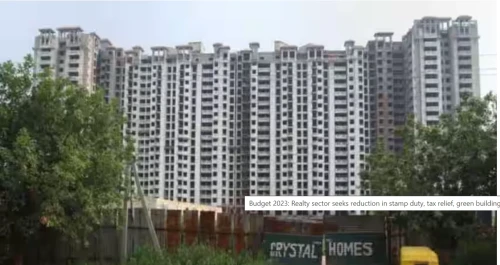
Budget 2023: Realty Sector Reduction in Stamp Duty
Budget 2023: Realty sector seeks reduction in stamp duty, tax relief, green building push among other incentives
Budget 2023: As the Indian real
estate market emerges from the shadow of a global epidemic, it has higThe demand for residential housing in India's top
eight cities increased by more than 15 per cent year on year. Similarly, a
significant rebound is expected in 2023. The real estate industry expects the
government to take specific steps to smooth the road to recovery at a time when
it is dealing with post-Covid issues such as rising input costs and
razor-thin margins.h expectations for Budget 2023.
Despite the
fact that demand for real estate in India has increased in recent months, the
real estate and construction industries are hoping for some specific relief.
Even though the Coronavirus pandemic reduced site visits and home demand across
the country, the months that followed inspired confidence with a resurgence in
housing demand.
What the real estate industry expects from
Budget 2023
Speaking of the same,
Gurmit Singh Arora, National President, Indian Plumbing Association said,
"Stamp duty needs to be reduced. Following the implementation of GST, the
industry was burdened, and it is extremely difficult for builders to pass it on
to consumers. This can be accomplished by granting waivers rather than
incentivizing it. In order to reduce the nation's carbon footprint, the
government should incentivize green building. The government should also
encourage and recruit more entrepreneurs."
There is an express need for more tax sops for home buyers as well as investors. In the opinion of Nakul Mathur, MD, Avanta India, "Indian real estate stands on a strong footing with a hike of 50% in sales transactions in 2022, compared to the previous calendar year. The positive sentiments will continue in 2023 backed by a healthy economic outlook, expansion in the job market, and a rise in per capita income. Meanwhile, it is also imperative for the governing agencies to take proactive steps to further build consumer demands alongside streamlining the supply cycle. Steps such as reducing GST rates on raw materials such as cement & steel, offering better credit for developers, and single window clearance can immensely help the overall sector."
Hari KishanMovva, Senior Vice President, SILA (Real Estate) comments, “Commercial real estate had a mixed year in 2022 with flexible office providers performing well. The 2023 budget the industry hopes will offer some positives to help strengthen the real estate market. Given that the inflationary environment is the key risk for real estate, we are also expecting a leeway in terms of reduction in GST rates for key raw materials and re-introduction of input tax credit which would help developers tide over inflationary pressures.”
Adding to the same, Siddharth Maurya, Resource Specialist, Expertise Real-Estate and Fund Management states, "The government must recognise the sector's importance and implement significant policy changes to accelerate growth in real estate demand. Currently, up to 2 lakhs in interest on home loans can be deducted from income tax. This should be revised and increased in order to stimulate demand in the sector. Similarly, GST waivers or reductions on raw materials such as cement, steel, and so on should be made available. Raw material prices are rising, and lowering GST rates could provide significant relief to the developer community. Giving the sector infrastructure status is also long overdue, as it can aid in the sector's liquidity."
Looking back at the year 2022 as the most eventful years for Indian real estate with sales recovery observed in many of the major markets in the country, Mrinaal Mittal, Director, Blackteak Realty said, “Real Estate Industry is very sanguine about the 2023 budget and hopes to continue the strong momentum of the previous year. The primary emphasis and ask is higher tax exemption on home loans to generate a healthy demand. As for the LTCG, the tax rate should be decreased with relaxation on the time limit on construction of the new property. The extended timelines for buildings that are under construction to balance capital gain would be a very welcome step for boosting this industry. Such endeavors will not only encourage more consumers to buy homes but also create higher accessibility. The new budget can bring about many desired and vital changes to the real estate industry, benefiting consumers and developers alike so that they can keep contributing to India’s growth story."
Shiv Parekh, founder, hBits, said that the sector has achieved a remarkable recovery despite COVID and made substantial contribution to the economy. "The government should offer some key relaxations in taxes and waivers, and there should be some reduction on GST in raw materials like cement, steel and tiles. The deduction limit for interest payment on home loans should be increased from the existing Rs 2 lakh a year to Rs 5 lakh and 1.5 lakh limit of principal deduction on housing loans should be increased to 5 lakhs to push the affordable as well as luxury housing segment, which is the need of the hour," he said.
"Commercial real estate too needs a greater push, especially in the Tier 2 and 3 markets as there is huge scope for growth in those markets. Reduction in tax rate from 30 to 25% would definitely help the overall sector," he added.

